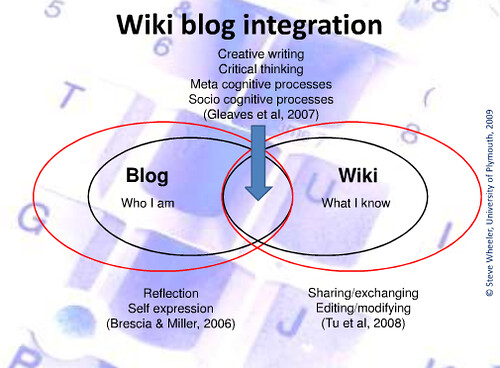
Sunday, June 28, 2009
Our Class Wiki - So Far

Wednesday, June 24, 2009
The Next New Thing
- First "disguise" -- ALARM CLOCK. Set up the night before to fulfill the purpose of waking you up. Upon success, you turn it off and morph it into your cell phone.
- Second disguise -- CELL PHONE. Check messages.
- Third disguise -- WRIST WATCH. Snap it on, go to work.
- Fourth disguise -- LAPTOP. Put the gadget on your desk, push a button and watch it morph into your personal PC.
- Fifth disguise -- iPOD. Hit the gym without having to store all your valuables in a public locker.
- Sixth disguise -- CAMERA. Take a picture of a restaurant on your way home and wirelessly send it to someone as a dinner suggestion.

Monday, June 22, 2009
Advice to Baruch College

OLD vs. NEW


Wednesday, June 17, 2009
Modeling Reality with Virtual Worlds
 These new technologies allow "employees separated by thousands of miles [the ability] to mingle, interact and share ideas in the virtual world before their first day on the job," (Frauenheim, 2006).
These new technologies allow "employees separated by thousands of miles [the ability] to mingle, interact and share ideas in the virtual world before their first day on the job," (Frauenheim, 2006).
Virtual Worlds create an atmosphere that users can feel completely comfortable in; "You're on your own computer, in your own room, your own space," (Saidi).
Not only do you receive the benefit of feeling relaxed, but it differs from "video-conferencing" in that you get to create an "Avator," which is a virtual representation of yourself. These can resemble the way you look in real life, or have fairy wings attached!
Businesses can use these worlds in a number of ways. One easy way to implement this technology is through employee training; "the video game play adds a dimension of training because people don't perceive it as learning. That makes them more willing to take risks and be more flexible in their thinking," (Frauenheim, 2006).
**BeYoNd ThE cOrPoRaTe WoRlD**
Many people have already put these virtual worlds to great use.
For example, many toy companies have added online-codes to their toys that allow the consumer to not only play with the physical toy, but also play with other people's "virtual" toys online. Visit Webkinz.com to see for yourself....
Additionally, MTV has created several 3-D, Internet-based social networks that are virtual representations of popular cities, replicating everything from clubs to bars to delis to the weather! They are creating a realistic imitation of what the city looks and feels like, as well as everything it has to offer you (entertainment, food, lodging) if you plan to visit.
Furthermore, there are even virtual worlds for those with autism. Autism is "a range of brain disorders that can cause difficulties in social interaction, communication and behavior," (Saidi). Having this type of virtual resource center allows users to get "familiar with an environment before they actually try it out in real life," (Saidi).
As we all very well know, every great invention has a cynical twin.
So is this the case for virtual worlds as well? Sure, why not....Creeps are never going to stop creepin', this is yet another way for them to prove their skills.
However, most of these virtual worlds are "self-policing communities...users would likely be quick to report any behavior that seemed to indicate [if] users posed real-world threats," (Musgrove, 2008).
With that being said, I believe that, sadly, the true evil counterpart of the virtual world is addiction.
If misused or abused, people have the potential to get too sucked into these virtual realities, and be led even further astray from actual human interaction than they were before.
The fact that people can become too comfortable in a video game-like setting to ever face reality again is both scary, but more so sad...
However, if used correctly, these Internet-based worlds can be extraordinary learning tools for an array of disorders, phobias, and so on.
Like everything in life, this technology offers plenty of gray areas and fine lines between it's benefits and harms. And to be redundant, it will become exactly what you make of it.
These worlds offer much greater future benefits than threats anyway....
These can be successfully utilized in businesses, education, for boredom, and much more. Like social media, virtual media opens a door for boundless possibilities.
For instance, virtual worlds could be used for high school students during their college search. In these worlds, they could meet potential classmates, and virtually move into their dorm room "early," and get to know their hall mates, etc.
Likewise, these virtual realities could allow applicants to explore companies, meet their potential co-workers and discover if they fit in with the company's system and core values, BEFORE even applying for the job.
Lastly, this virtual media could benefit advertising by allowing buyers to virtually test out products to see how they would fit into their lifestyle, and/or if the product could offer additional benefits to their current living situation.
This technology can truly minimize geographical separations between people, beyond the way social networks can, and bring people from all over the world together quickly and easily.
And ultimately, it puts the control back into the hands of the consumer. And Lord knows, we all love power!
References
Frauenheim, Ed. "IBM Learning Programs Get a 'Second Life.'" 17 October 2006. 16 June 2009.
Musgrove, Mike. "At Hearing, Real and Virtual Worlds Collide." The Washington Post. 2 April 2008. 16 June 2009.
Saidi, Nicole. "iReport: 'Naughty Auties' battles autism with virtual interaction." CNN. 16 June 2009.Tuesday, June 16, 2009
Social Networking

References
Goodnoe, Ezra. "How To Use Wikis For Business." InformationWeek. 8 Aug. 2005. InternetWeek. 10 June 2009
MY NEW MEDIA CLASS - SO FAR

New media defines the technological developments of computers, digital media and the Internet. If it is digital, dynamic and networkable then it qualifies as “new media”.
Nowadays, most businesses are using new media to help them in their online marketing campaign, specifically with Internet advertising.
However, having an online business does not guarantee that people will automatically visit your website. So, how do you inform people that your website exists: Internet marketing.
So is OLD MEDIA dead?
"Content management systems will always have their place in the publishing world, but they've never been the best tools for business collaboration. A simple open-source app called the Wiki may soon rule the knowledge management roost," (Goodnoe, 2005).
Saying that Old Media is dead is a bit harsh. Think about it, without OLD media, we would have never discovered NEW media! So no, we could never kill it off. In fact, many old mediums are still going strong, such as TV and magazines.
The main benefits that New Media is offering exists in the Business world.
New Media allows businesses to establish a quick and cheap organizational tool without having to sacrifice functionality, security, or duralibilty, (Goodnoe, 2005). It provides a universally accessible location to manage and organize information.
Simply put, NEW MEDIA has brought about an
EMERGENCE OF CONVERGENCE.
Convergence is a current process whereby new media and communications technologies are changing not only our media equipment, but the ways old media institutions have worked as well.
It is continually globalizing and changing our systems of gaining knowledge.
The process is still in transition as new developments are rapidly emerging. To follow trend, in a few years all of these processes will have matured and will be less dynamic than they seem today.
A huge example of convergence technologies, that nearly every American can relate to, is the way that mobile phones are now turning into multi-player gaming machines or mini-GPS devices that can send back images through wireless technology.
THE PERFECT EXAMPLE: the one and only iPhone.
References
Goodnoe, Ezra. "How To Use Wikis For Business." InformationWeek. 8 Aug. 2005. InternetWeek. 10 June 2009
Locher, Margaret. "More of How to Build Your Own Wikipedia." CIO. 17 April 2008. 10 June 2009.
Blogs vs. Wikis

- Blogs allow you to control the information that is available to the public
- Wikis, without the appropriate control, can be very susceptible to Internet fallacies.
- A Blog allows you to see exactly who posted each comment, without compromising the integrity of the content.
- However, Wikis encompass the highly-notarized American notion of "freedom of speech," as well as allow for the emergence of unanticipated information, instantly.
